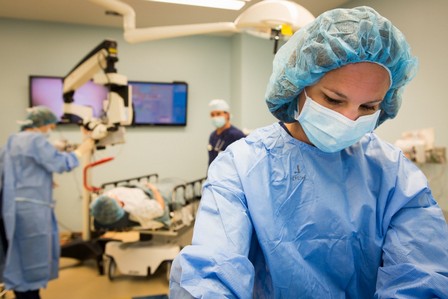2017.02.01.2
Files > Volume 2 > Vol 2 No 1 2017
CARTA AL EDITOR / LETTER TO EDITOR
Hidden clinical trials harm patients – but a powerful coalition is fighting for change
Los ensayos clínicos ocultos perjudican a los pacientes – pero una poderosa coalición lucha por el cambio
Sile Lane
Traducido por Andrea Cervera, Centro Cochrane Iberoamericano, Barcelona
Available from: http://dx.doi.org/10.21931/RB/2017.02.01.2
Hidden clinical trials harm patients – but a powerful coalition is fighting for change
Clinical trials are at the heart of modern medical research. They are the best way we have of testing whether a medicine is safe and effective. Around the world every year pharmaceutical companies, universities, government research institutes and charities fund and run tens of thousands of trials.
However, the results of around half of all clinical trials currently remain hidden. We don’t know what was done and what was found out in thousands of trials on medicines we use today. There is no complete list of all clinical trials, so we do not even know that some trials have taken place, never mind what was found in them. As a result, a huge amount of medical research goes to waste. Potentially valuable findings are lost, researchers unknowingly duplicate each other’s work, and gaps in knowledge are hard to identify. This has a direct impact on doctors’ and patients’ abilities to make informed choices about treatment options. Doctors can’t be sure that they are prescribing the best medicines for their patients and aren’t in fact doing harm.
Here’s an example. A heart drug called Lorcinide was tested in trials in the 1980s. The results of the trials showed that the people in the trial who were taking Lorcinide were far more likely to die than those not taking it. But those results weren’t published. Not until ten years later. In those ten years, doctors continued to give patients medicines like Lorcinide and it is estimated that 100,000 people in the US died as a result.
There is a human cost to non-publication of trial results too. Usually a few hundred people take part in trials but big trials can involve more than 1,000 people. These people are patients in the main. They volunteer knowing that it may or may not help them personally — but they volunteer thinking that it will benefit people like them in the future. When the findings they helped are not shared with doctors and researchers, that is an enormous betrayal of their trust. So, if thousands of trials have never published results, that’s hundreds of thousands, maybe millions, of volunteers whose trust is betrayed.
In order to fix the problem, the AllTrials campaign calls for all clinical trials – past, present and future – to be registered and their methods and results reported. Registration with a trial register like ClinicalTrials.gov ensures that researchers everywhere can find out what trials have been conducted on a given drug or disease. Posting results on the same register ensures that the discoveries made during a trial are not lost – even if that trial was discontinued or ended in failure, in which case its results are unlikely to be published in academic journals. Sharing the full methods ensures that independent researchers can review the work done by their peers and build on their findings.
To date, over 700 patient groups and professional organisations, including the American Medical Association, have joined AllTrials and added their voices to the campaign. Working together, this broad coalition has begun to turn the tide. Rising awareness of the immense human and financial cost of hidden trials has spurred governments, regulators, research institutions and professional bodies into action. Pharmaceutical giant GlaxoSmithKline joined AllTrials and committed to greater clinical trial transparency. The International Committee of Medical Journal Editors has announced that it will no longer publish papers based on non-registered trials. In the UK, anyone planning to run a clinical trial must commit to registering it in order to receive ethics approval. Laws and regulations in the European Union, the United States and beyond are consistently evolving towards mandating greater clinical trial transparency. In September 2016, the United Nations called on governments worldwide to pass legislation requiring clinical trials to be registered, and their methods and results to be fully reported.

AllTrials is currently stepping up its efforts to build on this incredible momentum and to make some permanent changes to clinical trial reporting. We have published a roadmap to transparency showing how and where individuals and organisations can bring pressure for change. The roadmap clearly spells out what doctors, researchers, universities, patient groups, and professional associations around the globe can do to help ensure that all trials are registered and reported. To reach broader audiences, I went to Madrid to give a TEDx talk about AllTrials that has already been viewed over 10,000 times.
This year, will publish a major study of global pharmaceutical companies’ trial registration and reporting policies. The study is expected to receive broad media coverage worldwide and has already had positive results, with several companies pledging to revise their policies in the near future. Over the course of 2017, AllTrials and the hundreds of organisations who are part of the campaign will use new tools like OpenTrials and TrialsTracker to identify specific trials that have never posted results and help get them reported. We have exciting plans that could change clinical trial reporting forever. Join us.
Readers curious about the AllTrials campaign can visit its Spanish language website at http://www.alltrials.net/espanol/.
_______________________________________________________________________________________________________________________
Los ensayos clínicos ocultos perjudican a los pacientes – pero una poderosa coalición lucha por el cambio
Los ensayos clínicos son el fundamento de la investigación médica moderna. Constituyen la mejor forma existente de analizar si un medicamento es seguro y eficaz. En todo el mundo, cada año, empresas farmacéuticas, universidades, institutos de investigación gubernamentales y fundaciones financian y realizan decenas de miles de ensayos.
No obstante, actualmente los resultados de alrededor de la mitad de todos los ensayos clínicos se mantienen ocultos. Desconocemos los hallazgos de miles de ensayos sobre fármacos utilizados hoy en día. No existe una lista completa de todos los ensayos clínicos, por lo que no sabemos ni tan siquiera de la realización de algunos ensayos, independientemente de lo que averiguaran. En consecuencia, enormes cantidades de investigaciones médicas se desperdician. Se pierden hallazgos posiblemente valiosos, los investigadores duplican inconscientemente el trabajo de otros y resulta difícil identificar las brechas en el conocimiento. Esta situación tiene repercusiones directas sobre la capacidad de médicos y pacientes de tomar decisiones informadas sobre las opciones de tratamiento. Los médicos no pueden estar seguros de si están prescribiendo el mejor fármaco para sus pacientes o de si, por el contrario, están dañándole.
Un ejemplo. En los años ochenta se estudió un fármaco para el corazón llamado lorcainida. Los resultados de los ensayos mostraban que los participantes que tomaban lorcainida tenían muchas más probabilidades de morir que aquellos que no lo tomaban. Pero estos resultados no se publicaron. Tardaron diez años en hacerlo. En esos diez años, los médicos continuaron prescribiendo a sus pacientes fármacos como lorcainida y se calcula que 100 000 personas murieron en EE. UU. a consecuencia de ello.
El no publicar resultados de ensayos también tiene un coste humano. A menudo unos cuantos cientos de personas participan en ensayos, pero los ensayos grandes pueden implicar a más de mil participantes. Estas personas son pacientes en su mayoría. Se ofrecen voluntariamente sabiendo que podría o no beneficiarles personalmente, pero que ayudará a personas en sus situaciónes en el futuro. Cuando esos hallazgos a los que contribuyeron no se comparten con médicos e investigadores, se produce una enorme traición a su confianza. Por lo tanto, si existen miles de ensayos que nunca han publicado resultados, existen cientos de miles, tal vez millones, de voluntarios cuya confianza ha sido traicionada.
Con el fin de poder arreglar el problema, la campaña AllTrials hace un llamamiento a registrar todos los ensayos clínicos (pasados, presentes y futuros) e informar sus métodos y resultados. Registrar un ensayo en un registro como ClinicalTrials.gov asegura que los investigadores de todo el mundo puedan averiguar qué ensayos se han realizado sobre un fármaco o enfermedad concretos. Publicar los resultados en el mismo registro garantiza que los descubrimientos hechos durante el ensayo no se pierdan, incluso si el ensayo se interrumpió o fue un fracaso, en cuyo caso es poco probable que sus resultados se publiquen en revistas académicas. Compartir la metodología completa asegura que investigadores independientes puedan revisar el trabajo realizado y construir sobre estos hallazgos.
Más de 700 organizaciones de pacientes y profesionales, incluyendo la American Medicalla Unión Europea
 En estos momentos, AllTrials está aumentando sus esfuerzos para construir sobre este increíble impulso y llevar a cabo cambios permanentes en el informe de ensayos clínicos. Hemos publicado una hoja de ruta hacia la transparencia que muestra cómo y dónde pueden presionar para el cambio personas individuales y organizaciones. La hoja de ruta claramente establece de forma clara qué pueden hacer médicos, investigadores, universidades, grupos de pacientes y asociaciones profesionales de todo el mundo para ayudar a garantizar el registro e informe de todos los ensayos clínicos. Para llegar a un público más amplio, me desplacé a Madrid para dar una charla TEDx sobre AllTrials que ya tiene más de 10 000 reproducciones.
En estos momentos, AllTrials está aumentando sus esfuerzos para construir sobre este increíble impulso y llevar a cabo cambios permanentes en el informe de ensayos clínicos. Hemos publicado una hoja de ruta hacia la transparencia que muestra cómo y dónde pueden presionar para el cambio personas individuales y organizaciones. La hoja de ruta claramente establece de forma clara qué pueden hacer médicos, investigadores, universidades, grupos de pacientes y asociaciones profesionales de todo el mundo para ayudar a garantizar el registro e informe de todos los ensayos clínicos. Para llegar a un público más amplio, me desplacé a Madrid para dar una charla TEDx sobre AllTrials que ya tiene más de 10 000 reproducciones.Este año, será publicado un importante estudio sobre las políticas de registro e informe de ensayos de empresas farmacéuticas internacionales. Se espera que el estudio reciba cobertura mediática en todo el mundo y de resultados positivos, como el compromiso de varias farmacéuticas de revisar su política en un futuro próximo. A lo largo de 2017, AllTrials y cientos de organizaciones que forman parte de la campaña utilizarán herramientas como OpenTrials y TrialsTracker para identificar ensayos específicos que nunca han publicado resultados y ayudarles a hacerlo. Tenemos planes emocionantes que podrían cambiar el informe de ensayos clínicos para siempre. Únete a nosotros.
Los lectores interesados en la campaña AllTrials pueden visitar el sitio web en español en http://www.alltrials.net/espanol/.
Síle Lane, AllTrials campaign, London


